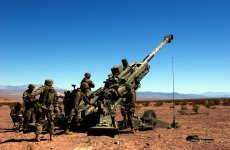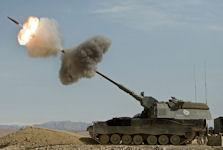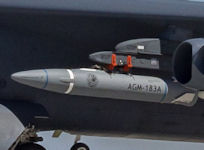Russo-Ukraine War - May 2022
| Su | M | Tu | W | Th | F | Sa |
|---|---|---|---|---|---|---|
| 1 | 2 | 3 | 4 | 5 | 6 | 7 |
| 8 | 9 | 10 | 11 | 12 | 13 | 14 |
| 15 | 16 | 17 | 18 | 19 | 20 | 21 |
| 22 | 23 | 24 | 25 | 26 | 27 | 28 |
| 29 | 30 | 31 |
A number of claims and counterclaims are being made on the Ukraine-Russia conflict on the ground and online. While GlobalSecurity.org takes utmost care to accurately report this news story, we cannot independently verify the authenticity of all statements, photos and videos.
On 24 February 2022, Ukraine was suddenly and deliberately attacked by land, naval and air forces of Russia, igniting the largest European war since the Great Patriotic War. The military buildup in preceeding months makes it obvious that the unprovoked and dastardly Russian attack was deliberately planned long in advance. During the intervening time, the Russian government had deliberately sought to deceive the world by false statements and expressions of hope for continued peace.
"To initiate a war of aggression... is not only an international crime; it is the supreme international crime differing only from other war crimes in that it contains within itself the accumulated evil of the whole." [Judgment of the International Military Tribunal]
Russian President Vladimir Putin announced a "special military operation" in Ukraine in response to the appeal of the leaders of the "Donbass republics" for help. That attack is a blatant violation of the territorial integrity, sovereignty and independence of Ukraine. Putin stressed that Moscow's goal is the demilitarization and denazification of the country.
In the early days of the war, the Rrussians were trying to basically cut off the whole eastern part of the country by be -- being on three lines of axis from Kyiv, up from the south from Crimea, and then squeezing in from the east. Well, that didn't work, so they started to try to carve off the whole Donbas region by coming south out of Kharkiv and north out of Mariupol. Well, they haven't made much progress in that regard, so the effort now is to pinch off the very eastern, the far-eastern elements of the Ukrainian forces that are basically positioned between Severodonetsk all the way down to north of Popasna. So it is an encirclement effort for sure; it's just on a smaller geographic scale. And they are making incremental progress towards those goals, incremental progress out of Popasna, incremental progress out of Severodonetsk towards Lysychansk.
The upcoming anniversary of Russia’s liberation at the end of World War II on May 9 will not affect Moscow’s military operations in Ukraine, Russian Foreign Minister Sergey Lavrov said in an interview with Italian TV Mediaset on 01 May 2022. “Our soldiers will not base their actions on a specific date,” Lavrov said when asked whether May 9 would mark a milestone or turning point in the war. “We will commemorate our victory in a solemn manner but the timing and speed of what is happening in Ukraine will hinge on the need to minimize risks for civilians and Russian soldiers,” he added.
Western governments and analysts had anticipated that Russian President Vladimir Putin was intending to declare a victory in Ukraine in time for the May 9 celebrations during which Russia holds its annual huge military parade. Russia launched its invasion of Ukraine on February 24 but its progress has been stalled by Ukrainian resistance armed with Western military support.
Putin appeared to be under the impression that he can win the economic war being waged over his invasion of Ukraine. But as Maximilian Hess, Fellow at the Foreign Policy Research Institute noted "Putin is bringing a knife to a gun fight ... the interruptions to supply chains caused by sanctions are crippling Russia’s production capacities. In March, for example, there was a whopping 72 percent drop in passenger car production in the country. The Kremlin is also all but certain to formally default on its foreign debts in the coming days, which will make financing a future rebuilding of the economy extremely difficult. Moreover, Russian wealth abroad is increasingly under threat and the much celebrated exchange rate recovery has only been achieved thanks to extreme capital controls.... Sanctions have cut Russia off from foreign exchange reserves worth hundreds of billions of dollars, Russian imports are cratering amid restrictions on dual use and computer technologies, and Western firms are pulling out from Russia or “self-sanctioning” by refusing to sell goods there.
"Washington has warned that it may still cut off rouble convertibility entirely and there is no significant Western demand for roubles. This is precisely why Putin has ordered European gas firms to pay for the natural gas they buy from Russia in roubles. Payments for gas in the local currency would leave the window open for rouble convertibility – something the Kremlin desperately needs given oil prices are unlikely to remain so elevated permanently."
Few analysts had expected serious resistance to last more than a month. Indeed, Chairman of the Joint Chiefs of Staff, General Mark Milley had briefed Congress during closed-door briefings in early February 2022 that a full-scale Russian invasion of Ukraine could result in the fall of Kiev within 72 hours.
New York Times reports: "When Ukrainian forces launched an attack on one position visited by General Gerasimov, at School No. 12 in the Russian-controlled city of Izium on Saturday evening, he had already departed for Russia."
- Presumably Gerasimov was sent to the front to kick butts and take names, and get the "major offensive" un-stalled. A week into this operation, and there have been no meaningful Russian advances on any front. This offensive started slow and petered out fast.
- The Russian command system is so rigid and stratified that unless the senior commander is personally present giving extremely precise instructions, there is a tendency for nothing to happen because junior commanders are afraid of doing the wrong thing.
- Why was it essential that Gerasimov travel to the very pointy tip of the spear in Izium, within Ukrainian artillery range, rather than having junior commanders meet him half way, in Belgorod, for instance?
- Something is wrong with Russian OPSEC, since this is the second command post attack in as many weeks. Do the Americans have a little friend in the Kremlin? [possibly] Do the Russians use a stereotyped layout of tents to erect a field command post? [probably] Are Russian comms so insecure that meeting plans can be detected [probably]
- The Russians lack secure wideband communications that would enable such a meeting to be a teleconference. Putin likes to Zoom, but he has land lines that are probably absent with Russian troops in Ukraine. American commanders teleconference, but they have secure wideband satellites comms.
Michael Carpenter, the US ambassador to the Organization for Security and Cooperation in Europe (OSCE), told reporters in Washington that the suspected actions are “straight out of the Kremlin’s playbook” and will not be recognised by the White House or its partners and allies. Carpenter said the US and others have information that Russia is planning “sham referenda” in the self-proclaimed Donetsk and Luhansk “people’s republics” that would attach the entities to Russia. He also said there were signs that Russia would engineer an independence vote in the city of Kherson.
Putin could formally declare war on Ukraine as soon as May 9, a move that would enable the full mobilization of Russia's reserve forces as invasion efforts continued to falter. "I think he will try to move from his 'special operation,'" British Defense Secretary Ben Wallace told LBC Radio last week. "He's been rolling the pitch, laying the ground for being able to say 'look, this is now a war against Nazis, and what I need is more people. I need more Russian cannon fodder.'" Wallace added that he "would not be surprised, and I don't have any information about this, that he is probably going to declare on this May Day that 'we are now at war with the world's Nazis and we need to mass mobilize the Russian people.'" A formal declaration of war on May 9 could potentially bolster public support for the invasion. It would also, under Russian law, allow Putin to mobilize reserve forces and draft conscripts.
The bluntest assessment of how the Russian military offensive in Ukraine’s eastern Donbas region is going came from someone in a very good position to know. "The general conclusion, unfortunately, is bleak,” said Igor Girkin, a notorious Russian military commander and former intelligence officer who played an instrumental role when war first erupted in the Donbas in 2014. “In the best-case scenario, the enemy will be slowly ‘pushed out’ of the Donbas with large losses (for both sides, of course) across many weeks and possibly many months,” he wrote in a post on his Telegram channel on April 28. “Overall, the enemy is defending competently, fiercely, it controls the situation and its troops.”
Overall, the Russian military’s failures surprised many experts, who had predicted its larger and better equipped armed forces would quickly seize major objectives, like Kyiv and port cities such as Mariupol. Instead, Ukraine’s dogged defenders have inflicted unusually high casualties on Russian troops, as well as taking a severe toll on Russian weapons and equipment -- a fact due in large part to the massive supplies of weaponry being shipped from the West.
Western officials for weeks pointed to morale and discipline problems as being a major contributing factor to the underperformance of Russia’s military. That is also believed to be a factor in the unusual number of generals being sent to frontline positions, and then exposed to Ukrainian attack.
The use of Russian troops to strike on-target anti-ship missiles "Onyx" may indicate a lack of other types of high-precision long-range munitions in Russia. About it on 04 May 2022 reported a senior researcher at the US Naval Analysis Center, military analyst Michael Coffman and the Institute for War Studies (ISW). The report says that the strikes on military infrastructure in the Odessa region were carried out from the coastal missile complex "Bastion" by "Onyx" missiles. The Ministry of Defense of the Russian Federation stated that they struck at the logistics center at the military airfield.
Coffman says he is increasingly interpreting such launches as a sign that there are few other long-range missiles left in the Russian Armed Forces. "This is an expensive system to use as a minor role," writes Michael Coffman. The Washington Institute for War Studies also believes that the use of Onyx may indicate that Russian troops do not have enough other missiles. "Russian forces are short of other types of high-precision long-range munitions needed to destroy Ukrainian logistics," ISW said.
Former CIA director David Petraeus said 05 May 2022 Russian President Vladimir Putin's "efforts to make Russia great again" by invading Ukraine had "backfired." The retired US army general said Russia's army had "underachieved in virtually every conceivable area" since the war began on February 24. "For starters, they did not have a competent campaign plan. They attacked in five or six different locations. Their logistics proved absolutely abysmal. The level of training of their soldiers and their junior leaders is clearly inadequate," he said. After failing to capture any of Ukraine's major cities, Moscow was forced to pullback from territory around Kyiv and refocus on the separatist regions in the east.
In the wake of the invasion, the US, EU states and other countries imposed sanctions on Moscow and boosted investment in defense. Sweden and Finland are considering joining NATO, which would take the military alliance to 32 members. They are expected to make a decision this month. "Another consequence of Putin's effort to make Russia great again … has backfired and is serving to make NATO great again," Petraeus said, with the alliance having looked under considerable strain during Donald Trump's presidency. He also said Berlin's decision "to provide lethal military supplies and weapon systems to another country for the first time in Germany's post-World War two history" was "very, very significant."
The G7 club of wealthy nations committed 08 May 2022 to phasing out its dependency on Russian oil and issued a scathing statement accusing President Vladimir Putin of bringing “shame” on Russia with his invasion of Ukraine. “We commit to phase out our dependency on Russian energy, including by phasing out or banning the import of Russian oil. We will ensure that we do so in a timely and orderly fashion, and in ways that provide time for the world to secure alternative supplies,” the joint statement said. The statement from the Group of Seven -- France, Canada, Germany, Italy, Japan, Britain and the United States -- did not specify exactly what commitments each country will make to move away from Russian energy.
Hungary, along with Slovakia and the Czech Republic, which are all highly reliant on Russian energy supplies, have been pursuing more generous phase-out plans as the bloc struggles to agree on a timeline for the proposed embargo. Indeed, they have already secured a partial delay on the plan until next year. Foreign Minister Peter Szijjarto threatened in parliament to veto the sanctions package in its current form, wary of the economic damage. For his own part, Orban described the planned oil ban as "tantamount to an atom bomb being dropped on the Hungarian economy."
In early May, more than a battalion’s worth of soldiers and armoured vehicles attempted to cross the Siversky Donets river to try and cut off the Ukrainian defenders in the two cities. The likely crossing site had been previously surveyed by Ukrainian forces as a probable spot for a pontoon bridge river crossing. Ukrainian artillery units had zeroed in on the coordinates and bunched up columns of Russian armour were spotted by drones as Russian forces waited for the bridge to be assembled. The resulting barrage devastated them, annihilating the Russian units and destroying the makeshift bridge in the process.
 By mid-May 20222, Ukrainian forces appear to be counterattacking against Russia’s advance in the east and some areas outside of Kharkiv appear to have pushed Russian forces all the way back across the border and could even cut off some of the railway lines that are equipping Russian troops in the Donbas. Some of these maneuvers looked more like the Russians actually withdrawing from positions and then the Ukrainians moving in or the level of resistance the Russians are putting up is fairly limited. Russia had reportedly lost more than 650 tanks and about 3,000 other armored vehicles and heavy equipment so far in its invasion of Ukraine. Experts put the losses down to the advanced anti-tank weapons given to Ukraine by Western countries, poor strategy, low morale, and important design flaws.
By mid-May 20222, Ukrainian forces appear to be counterattacking against Russia’s advance in the east and some areas outside of Kharkiv appear to have pushed Russian forces all the way back across the border and could even cut off some of the railway lines that are equipping Russian troops in the Donbas. Some of these maneuvers looked more like the Russians actually withdrawing from positions and then the Ukrainians moving in or the level of resistance the Russians are putting up is fairly limited. Russia had reportedly lost more than 650 tanks and about 3,000 other armored vehicles and heavy equipment so far in its invasion of Ukraine. Experts put the losses down to the advanced anti-tank weapons given to Ukraine by Western countries, poor strategy, low morale, and important design flaws.
The united West is now at war with Russia on the territory of Ukraine at the hands of Ukrainians. Sergei Kiriyenko, First Deputy Head of the Presidential Administration of the Russian Federation, stated this on 19 May 2022, speaking at the New Horizons educational marathon. "You and I all understand very well that in a special military operation on the territory of Ukraine, Russia today is not fighting against Ukraine. The united West is fighting against us, just on the territory of Ukraine and, unfortunately, at the hands of Ukrainians. This is such a dramatic thing, but it's true ", - he said.
According to Kiriyenko, Russia is confronted by "the entire Western world" in the field of technology, weapons, control and communications systems. The first deputy head of the presidential administration of the Russian Federation noted that "unprecedented economic sanctions, simply unprecedented," were imposed on Russia, which had no analogues. An “incredible information war” has also been launched against the Russian Federation, in which “whole factories of fakes and lies” are involved, and a psychological war is also underway, Kiriyenko added.
The foundations of the emerging multipolar world are now being severely tested, but the crisis in Ukraine testifies to the failure of attempts to impose a unipolar world order. This was stated on 19 May 2022 by the head of the Committee of the Federation Council on international affairs Grigory Karasin. "The crisis in Ukraine testifies to the collapse of attempts to impose a unipolar world order on the world community, within which all decisions are made in Washington. The practice of imposing illegal sanctions against Russian citizens, rabid Russophobia and attempts to impose a policy of isolating Russia on independent states are obviously failing," the senator said. during the meeting of ambassadors of foreign states in Russia, which was held as part of the XIII International Economic Summit "Russia - Islamic World: KazanSummit 2022".
The senator stressed that the foundations of the emerging multipolar world are being severely tested today. "Western countries decided to go all-in against Russia, they began to deliberately undermine the system of international relations that had developed after the Second World War. NATO's reckless expansion to the east, the refusal to take into account Russia's fundamental interests in security issues led to a crisis in Ukraine," Karasin said.
The stiff Ukrainian resistance continued to be assisted and aided by shipments from the west of weapons and material. And their very good command and control and organizational effort and the battlefield initiative, as well as problems the Russians have still had in overcoming their challenges, whether it's sustainment and logistics, command and control, unit cohesion, operational maneuver, integration of air to ground, they're trying to get better at that things -- those things but they haven't yet.
Every day, there are skirmishes and fights over, sometimes very small hamlets and villages, sometimes bigger cities, where the Russians make gains and then they lose those gains in the next day or so. So, every day, there's literally ground that's trading hands. The Ukrainians continue to fight bravely, stiffly, very creatively. And there was no diminution of their morale of their leadership ability and their desire and determination to defend every inch of their territory.
Germany, France and Italy began to reconsider their position towards Ukraine. They are increasingly leaning towards the end of hostilities as soon as possible. Foreign policy commentator Daniel Depetris wrote about this in an article for Newsweek magazine. He notes that earlier Berlin, Paris and Rome acted together with the USA, Great Britain and Poland for the "strategic defeat" of Moscow.
Germany, Italy and France are increasingly concerned about the end of hostilities in Ukraine as soon as possible , Depetris said. He also recalled the statement of former US Secretary of State Henry Kissinger, who called on Kyiv to start negotiations with Moscow as soon as possible. According to the expert, “shocks that will be difficult to overcome” may arise in the future. Zelensky may scoff at the idea of a ceasefire, but as the fighting drags on, he cannot ignore a scenario in which some Western leaders who are now staunch supporters of Ukraine will begin to reconsider their policies ,” Depetris concluded.
|
NEWSLETTER
|
| Join the GlobalSecurity.org mailing list |
|
|
|












